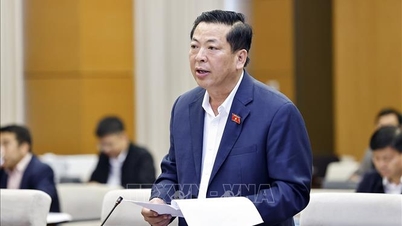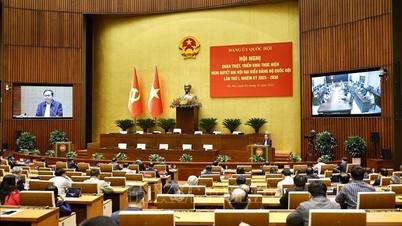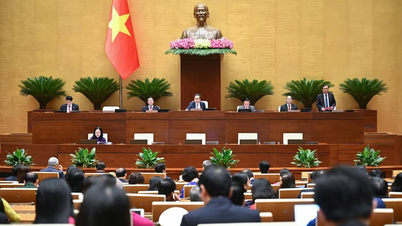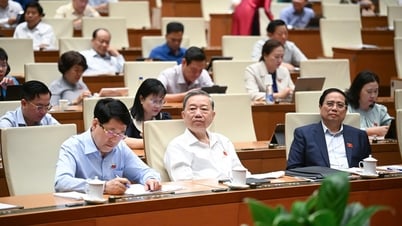National Assembly Chairman Vuong Dinh Hue said the important thing is not to force real estate trading through the floor, but rather whether the transactions can control the cash flow or not.
On the afternoon of August 24, continuing the 25th session, the National Assembly Standing Committee gave opinions on the draft revised Law on Real Estate Business , which is expected to be passed by the National Assembly at the 6th session later this year. Reporting on the expected reception and explanation of the draft law, Chairman of the Economic Committee Vu Hong Thanh said that, receiving the opinions of National Assembly deputies, the draft law removes the regulation on real estate transactions through the floor.

Chairman of the Economic Committee Vu Hong Thanh reported on the reception and revision of the draft Law on Real Estate Business.
GIA HAN
This amendment is intended to facilitate investors and customers to freely choose their transaction methods. However, the law will supplement regulations on encouraging organizations and individuals to trade, transfer, rent, lease-purchase houses, construction works and land use rights through real estate floors.
Mr. Thanh also said that the inspection agency believes that the practical summary of the implementation of the 2014 Law on Real Estate Business shows that current real estate trading floors do not ensure transparency and do not ensure the legal safety of transactions because the real estate trading floor is a beneficiary in the transaction relationship.
"Requiring transactions through real estate trading floors is inconsistent with the current legal system, hinders freedom of business, poses a risk of taking advantage of legal regulations to monopolize and disrupt the market, and does not ensure the implementation of the task of developing a healthy, safe, and sustainable real estate market," Mr. Thanh said.
However, the representative of the drafting agency, Deputy Minister of Construction Nguyen Van Sinh said: The Government still wants to regulate mandatory real estate transactions through the floor.
According to Mr. Sinh, the lack of mandatory regulations for trading through the exchange, only encouraging it, leads to many consequences regarding transparency, affecting buyers, and many disputes due to investors not being transparent.
"The Government really hopes that the National Assembly will make it mandatory to go through the floor to ensure transparency, prevent budget loss, and protect buyers, especially for very large real estate assets," said Mr. Sinh.
"Transparent floor, no one will follow"
Commenting, National Assembly Chairman Vuong Dinh Hue said: "The important thing is not to force people to go public. The important thing is whether the transaction can control the cash flow or not." If we increase the use of cashless transactions and payment via banks, "whether there is a public exchange or not is still transparent."

National Assembly Chairman Vuong Dinh Hue speaks at the meeting
GIA HAN
"The market must operate according to market principles. Otherwise, it will be like the period when we paid a high price for the gold exchange," said the National Assembly Chairman.
According to the National Assembly Chairman, "real estate companies organize their own distribution networks, in their own way, not all transactions are listed on the stock exchange."
"It's not good to have a floor. This place must be clear in terms of awareness. Don't worry about people here. National Assembly delegates at the last session talked a lot about this place as the Economic Committee mentioned," said the National Assembly Chairman, believing that if market information is complete and payments are cashless, then there will naturally be transparency.
"I believe that if the floor is transparent, people will follow it even if they don't force it. Don't force people to do things they don't want to do or can't manage, then ban them. I suggest you review this," the National Assembly Chairman emphasized.
Regulations on real estate transactions having to go through the floor were stated in the 2006 Law on Real Estate Business, but were later removed when the law was amended in 2014 and applied until now.
When submitting to the National Assembly the draft revised Law on Real Estate Business at the June session, the Government proposed to re-apply the condition that future real estate must be sold through a trading floor.
However, in the subsequent discussion, many National Assembly delegates suggested not to make it mandatory , but only to encourage real estate transactions through the floor. Because transactions through the floor can increase costs by 2-8%.
Some opinions suggest applying alternative measures to mandatory transactions through the floor, such as connecting notary databases, land registration and real estate transactions to ensure legal safety and higher transparency compared to real estate floors.
Thanhnien.vn





![[Photo] Cutting hills to make way for people to travel on route 14E that suffered landslides](https://vphoto.vietnam.vn/thumb/1200x675/vietnam/resource/IMAGE/2025/11/08/1762599969318_ndo_br_thiet-ke-chua-co-ten-2025-11-08t154639923-png.webp)




































![[Video] Hue Monuments reopen to welcome visitors](https://vphoto.vietnam.vn/thumb/402x226/vietnam/resource/IMAGE/2025/11/05/1762301089171_dung01-05-43-09still013-jpg.webp)
































































Comment (0)